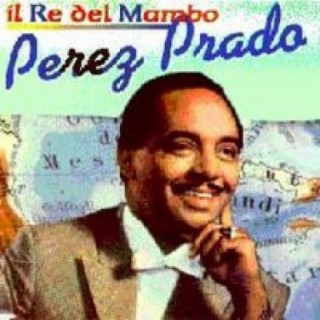
Perez Prado
Damaso Pérez Prado was born in the heavily Afro-Cuban area of Matanzas, Cuba, on December 11, 1916 (though he habitually gave his birthdate as five years later). According to custom, he carried both his father's and mother's last name; his earliest recordings were issued under the name D. Pérez Prado, but the "D." was dropped on his American releases, and in 1955 he had his full name legally shortened to Pérez Prado. Starting in childhood, Prado studied classical piano, and by the time he finished school, he was good enough to play piano and organ professionally in local clubs and movie theaters. He moved to Havana around 1942 and freelanced for a number of smaller orchestras over the next year or so...more
Songs(87)
Albums(11)
Playlists(0)
-
1
-
2
-
3
-
4
-
5
-
6
-
7
-
8
-
9
-
10
-
11
-
12
-
13
-
14
-
15
-
16
-
17
-
18
-
19
-
20
-
21
-
22
-
23
-
24
-
25
-
26
-
27
-
28
-
29
-
30
-
31
-
32
-
33
-
34
-
35
-
36
-
37
-
38
-
39
-
40
-
41
-
42
-
43
-
44
-
45
-
46
-
47
-
48
-
49
-
50
Listen to Perez Prado’s new songs including "Mambo Jambo / I Love Napoli", "Perfidia (Orchestra Version)", "Macarena" and many more. Enjoy Perez Prado’s latest songs and explore the Perez Prado’s new music albums. If you want to download Perez Prado songs MP3, use the Boomplay App to download the Perez Prado songs for free. Discover Perez Prado’s latest songs, popular songs, trending songs all on Boomplay.
Perez Prado Biography
Damaso Pérez Prado was born in the heavily Afro-Cuban area of Matanzas, Cuba, on December 11, 1916 (though he habitually gave his birthdate as five years later). According to custom, he carried both his father's and mother's last name; his earliest recordings were issued under the name D. Pérez Prado, but the "D." was dropped on his American releases, and in 1955 he had his full name legally shortened to Pérez Prado. Starting in childhood, Prado studied classical piano, and by the time he finished school, he was good enough to play piano and organ professionally in local clubs and movie theaters. He moved to Havana around 1942 and freelanced for a number of smaller orchestras over the next year or so
Comments (0)
New Comments(0)
FAQs about Perez Prado
Where is Perez Prado from?
He is from Cuba.
How to download songs of Perez Prado?
You can download songs of Perez Prado from Boomplay App for free.
Firstly, install Boomplay app on your mobile phone.
Secondly, navigate to the song you would like to download.
Thirdly, Tap on More > Download.